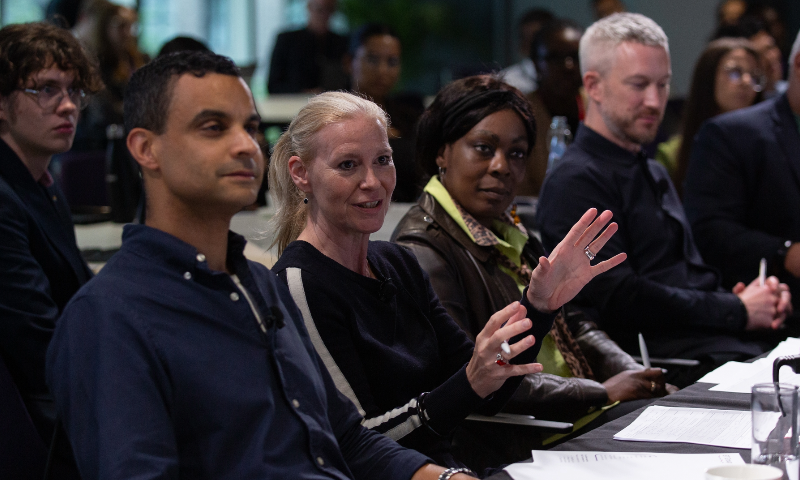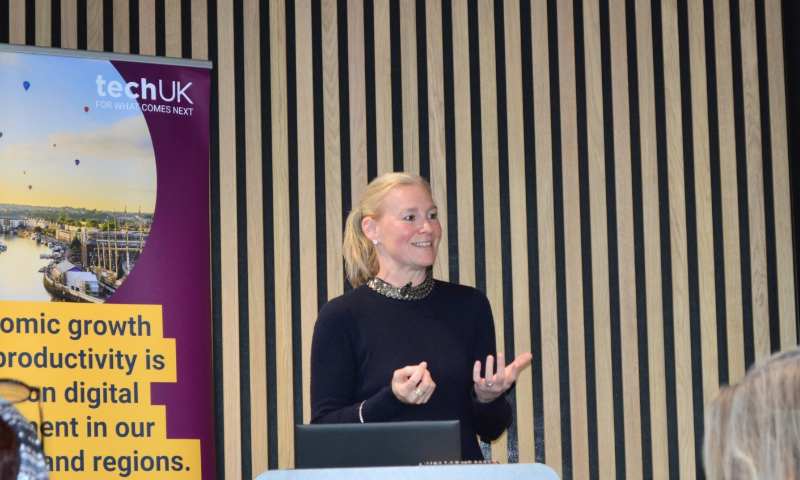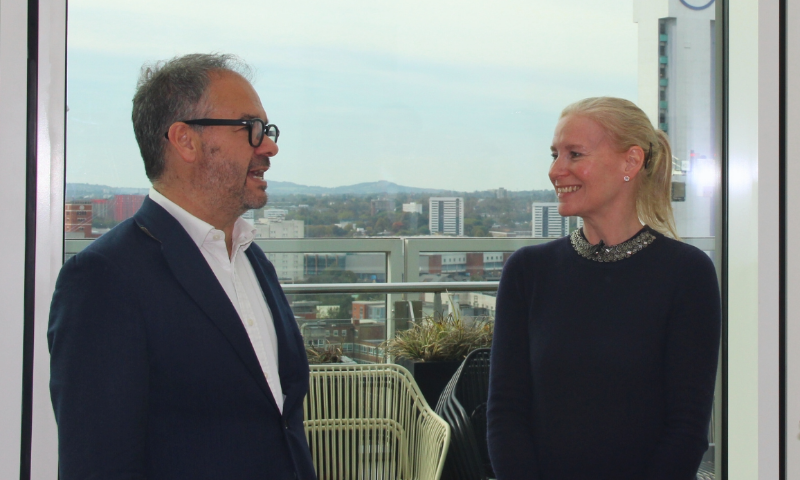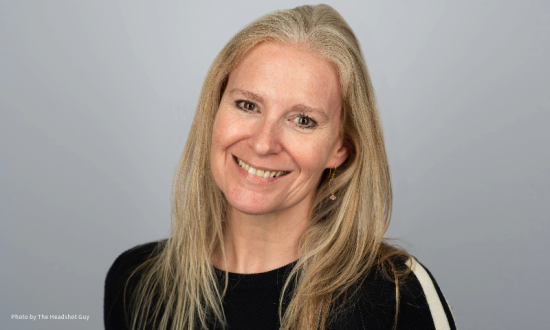Just under thirty years’ experience in TMT, Professor Kerensa Jennings is an award-winning tech leader, storyteller and advisor combining a rare skillset of communications expertise, technology and media leadership. Her work has impacted millions of people in more than 100 countries. Awarded for last eight years by Computer Weekly among the most influential tech leaders in the UK, Kerensa was previously a CEO and Director at the Royal Household based at Buckingham Palace, and Head of Strategic Delivery reporting to ExCo at the BBC. She is a Thought leader and keynote speaker on data, AI, diversity, inclusion, storytelling, Fellow of the RSA and co-host of AI and Women in Tech series on The Tech Leaders Podcast.
Recently, in an exclusive interview with Digital First Magazine, Kerensa shared her insights on the impact of AI on data science, the top 3 data science trends to watch out for in 2024, her professional background, significant career milestones, future plans, pearls of wisdom, and much more. The following excerpts are taken from the interview.
Do you think that data science is perceived to be more important than ever before? And what has been the impact of AI on data science?
Data has been important since ancient times, when crops were counted and audited and trades were documented to help manage commercial and societal needs of civilisations going back millennia. Through history, data science has evolved as a multi-disciplinary field where the patterns and correlations between individual data points and full data sets can be used to analyse trends, make forecasts, optimize business decisions and enhance societal and commercial outcomes.
Artificial Intelligence is nothing new. It’s been around since the 1950s. If computing power is AI’s engine, data is its fuel. As the range of AIs rapidly evolve, new use cases are being born virtually every day. From classifications, recommendations, natural language processing and optimising to reasoning, analysis and learning, we are in the midst of one of the most inspirational moments in technological development.
According to you, what are the top 3 data science trends to watch out for in 2024?
I think predictive analytics is going to be very exciting for healthcare, town planning, and climate change. I am also really interested in how data science will help unleash the power of creatives across all areas of the sector, from music to movies to gaming, publishing and beyond. And I think an exam question that data science itself could help try to solve is around access to data and the barriers data scientists face regarding volumes, quality and security of data.

Kerensa, please tell us about your background and areas of interest.
Storytelling is my passion and I feel most in my flow when I am creating something, be that content, product or ideas. I was a television producer for many years, and I am a bestselling author as well as Visiting Professor of Media, Strategy and Communications. So, creativity is my core – and I love finding ways of using my talents to help make the world a better place.
Sometimes that is through my portfolio work. I chair the Board of Trustees at a charity that helps civil society with digital, data, AI and design; and I am a Trustee at one of our national museums. I am also proud to be an independent non-executive director at a water company. There is very little in life that matters as much as water. I am involved with a variety of organisations that try to make life better for people- from Founders4Schools to The Female Lead and TeenTech. And of course, in my day job I live and breathe the purpose of my company, BT, which connects for good and aims to be the world’s most trusted connector of people, devices and machines.
I am both a driven and an empathic person, with an unusual combination of skillsets. One moment I might be coaching someone (I am a professionally qualified executive coach), the next advising a Board, then writing a poem, designing a product or making a podcast.
I do my best to lead a fulfilling and meaningful life, something I am even more motivated to do since my Mother died last year.
Brief us about your current roles and responsibilities as Group Director, Data Platforms at BT.
I lead a team which leverages the power of data and AI to create technology solutions that improve lives. I am an intrapreneur, creating start-ups to help accelerate BT’s potential. I have most recently been developing a secure wallet for the new EE ID; and leading the POC development of an anti-fraud product.
I also represent BT in a variety of ways in the media and at events. Sometimes I deliver keynotes such as one I did earlier this year for the Home Office Cyber Security annual conference; another for the ICO leadership team; and one scheduled next week for the Next Generation Digital Leaders. I also chair techUK’s Local Digital Capital Working Group for BT, so I opened and hosted Birmingham Tech Week kick off a few weeks ago for techUK and chaired a panel on digital skills. And I co-host The Tech Leaders podcast.
I also do quite a bit for BT on diversity, equity and inclusion, and am proud to have been shortlisted in a national award this year for my work in this space.

In your opinion, what are the biggest challenges faced by women in tech that aren’t typically faced by their male counterparts? What would you suggest to address this gap?
I speak to a wide range of women of different ages, backgrounds, talents, aspirations and experiences. It’s hard to generalise I think, and I don’t believe it’s a simple question to answer. Some women feel they don’t have a voice. Others that they are not given a seat at the table. Some worry that they are not good enough (although very often they are); and some feel discriminated against on grounds of race, neurodiversity, age, religion, physical access needs and social background as well as gender.
A few themes emerge, I think. Women often feel marginalized and underestimated, which can feel counter intuitive particularly when they in many cases take on the lion’s share of domestic and care tasks as well as professional responsibilities. Women often notice that they can share a bright idea in a room, for it to be ignored then re-voiced a little later by a man to a vibrantly enthusiastic reception, as if the first time it has been raised. And then there is the question of both pay and representation, with women lagging behind on both.
To address the gaps, I think everyone should read The Female Lead’s research on the economic power of women. The Female Lead, founded by Edwina Dunn CBE, is a remarkable organisation helping shine a light on the issues. The more of us are aware and understand, the more of us can tackle inequities and help rise up other women. In my experience enlightened men as well as empathic women can be among the best allies for this. Help them understand and you will find in many cases they will do their utmost to help you. BT Group’s Director of Talent, Steve Cunningham, and our our inclusion and diversity lead Cordelia Osewa-Ediae are among the best in the business.
I also think getting involved proactively to help improve the life chances and potential of young people makes a big difference. The King’s Trust Women Supporting Women initiative, founded for His Majesty by Chrissie Rucker (founder of the White Company) is an excellent example of this, as is TeenTech, founded by Maggie Philbin OBE. These organisations help unlock confidence and agency.
At BT, our work with the Tech Talent Charter, The Aleto Foundation, Girls Talk, Code First Girls and FastFutures which all help enormously moving the dial for women and girls.
My best advice to other women is don’t compromise your values, or what makes you you. You are special, you are unique, you deserve to be here. Read Desiderata and re-read it every time you need a boost.
Who has influenced you the most in life and why?
Sherry Coutu CBE for her resilience, vision and grit. Maggie Philbin OBE for her dedication and selflessness. Edwina Dunn CBE for her dazzling intellect. My Grandad for achieving what I think is the ultimate goal of life – contentment. Rainer Maria Rilke for being a gifted writer, poet and philosopher. Michelle Ovens CBE for her endless optimism and capacity to work with me and others to help small businesses in the UK. Milan Kundera, Leo Tolstoy and Charlie Mackesy for showing the genius of the written word.
What lessons you have learned from your professional career? What risks have you taken in your career that have paid off?
Too many to list out, I think! I talked at length in my Squiggly Career podcast if anyone would like to hear in more detail.
To encapsulate it I would say ‘believe in yourself’. There are many twists and turns throughout your career, but retaining confident humility will serve you well.

What do you feel has been your ‘career-defining’ moment?
It was life changing when the BBC appointed me as Programme Editor of Breakfast with Frost. And when I became CEO of a Royal social enterprise (a digital and data platform) and worked at Buckingham Palace for four years, I felt truly proud. But my greatest achievement I think is my book. A psychological thriller called Seas of Snow which became a bestseller within four months of publication.
Where would you like to be in the next 5 years?
I am open minded! I aim to live a fulfilling life where I feel I can create impact with my talents.
Which technology are you investing in now to prepare for the future?
So many. I experiment with at least one piece of tech every single day. At the moment different AIs mostly. And I remain convinced blockchain will have its day.
What advice would you give to women who want to pursue a career in tech?
Technical skills are only part of the story. You will need to develop resilience, communication, collaboration and leadership aptitudes. Empathy and storytelling are greatly undervalued in business, but I think vital.
Some of the people you work with will be phenomenal. Learn from those you respect and appreciate. And learn how to be brave, even when you don’t feel very brave at all. Be true to yourself and be relentlessly you.
And don’t give up. If it doesn’t open, it’s not your door. If it does, step over the threshold and relish every moment with learning, curiosity and integrity.






